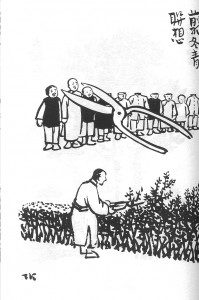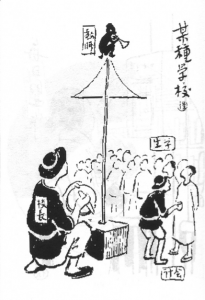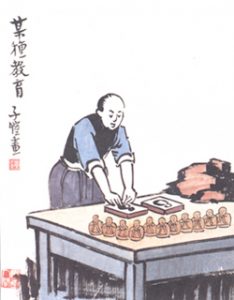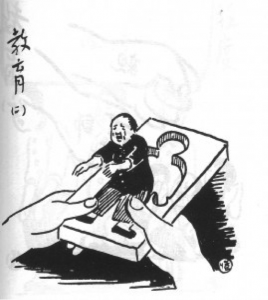Feng Zikai (1898-1975) is one of the most gifted political and artistic figures in China in the 1920s and 1930s. The 1920s was an era of deep political and social instability, a time when the future and destiny of China was blurry and uncertain.
Feng was a painter, writer, music educator, translator, calligrapher and art theorist. In fact, Feng is considered to be the founder of modern Chinese cartoon art. His essays and cartoons are still popular among the Chinese public today. Feng’s cartoons seek to furnish his viewer with a degree of critical distance. He injects irony into his paintings, so that his viewer will be prompted to take a step back and examine the social issues in China that are subtly embedded in his work.
The cartoons below reflect Feng’s critical perspective on a gamut of issues with the education system in China, which ranges from the elementary school to university level.
You can find more of his works here: https://www.pinterest.com/mymurmuring/feng-zikai/
Imagination”
To Feng, the job of an educator is similar to that of a gardener, who trims and prunes his plants so that they can flourish later. Feng draws his viewer’s attention to the cruel ways in which the education system in China stifles students’ minds and their ability to think for themselves. Feng suggests that the system in China is more interested to standardise students, pressuring them to conform to a certain pattern of thinking.
“Somewhat School”
Schools were part of the problem of perpetuating a vicious cycle of capitalism and standardization in learning. In this cartoon, the monkey on top of the pole is the teacher, the administrators are playing a tune, students are watching, and of course someone is collecting money.
“Somewhat Teacher”
Teachers might try to destroy students’ minds with endless drill and repetition. These teachers do not alter or update their pedagogy. Instead, they behave like a gramophone that is used to play the same old tune for years. Feng criticizes the formalist, stubborn teaching style practiced by some educators today, and he encourages them to innovate and improve themselves instead.
“Somewhat Education”
Figuratively speaking, education can be seen as a process of transforming raw materials into beautiful sculptures. In this cartoon, Feng criticises the Chinese education system that aims to kill the unique characteristic of individual, by shaping everyone using a singular template or model.
“Being educated”
This one follows the previous painting, but it is now from the perspective from the students. It does not seem fun for them to be shaped from this one model.
Questions:
Even though Mr. Feng passed away more than forty years ago, the severe problem of Chinese society and our education system persists. We still have not figured out a way to offer students with special talents another way to grow and the society still pushes young people so hard with mandatory college entrance examinations. I would like to ask your thoughts on the cartoons I posted:
- Do you have thoughts on why China still continues to adopt such a standardised way of assessing its students?
- How do you compare the current Chinese education system and the one Mr. Feng described in his paintings?
- Do you see any progress or regression in China?





More recently, contemporary artist Li Hongbo presented in NYC an installation on Textbooks :
https://creators.vice.com/en_us/article/li-hongbo-textbooks
He highlights the struggle for contemporary Chinese to move from their tradition to the western world, and how the meaning and the content of education are somehow “lost in translation”.
You will find photos and explanations online, the exhibit took place in February 2016, Klein Sun Gallery in Chelsea.
I have to say it is an meaningful and amazing exhibit. I regret to miss it. But these pictures on the links are so real. I can still remember when I was in middle school, All my classmates would throw away all the practice booklet right after getting off from finals. The trash can would be filled with tons of books. Students are expressing their anger and anxiety this way. I think you brought up really good exhibit we all need to see!!! The traditional way of learning and teaching has originally different with the western world. Western education is practical based or we can say it is skill training at the beginning. But Chinese education rooted from Confucius doctrine and its main goal is to train high moral standard. So originally, it is much more theoretical.
Thanks CJ for sharing these cartoons. They are really good and interesting, especially for those, like me, who were not familiar with Feng’s work. It is also impressive to see that after 50 or even 80 years many of the educational system critiques remain the same.
Thanks, CJ. These are really interesting and vivid cartoons that reflect the issues of Chinese education system.
China has a reputation for having a rigorous education system, scoring No.1 out of 65 nations in the latest Programme for International Student Assessment (PISA) test. I agree that the focus on test taking can rob students of creativity. Chinese students put an outsize amount of time into mastering these skills. This hard work isn’t paying off in terms of innovation. Although the government tried very hard to reform the education system in China to “Quality Education” and the College Entrance Examination (Gaokao) also reformed to reduce students’ pressure, the situation is not getting better obviously. The overwhelming importance of tests prevent teachers from focusing on developing students’ broader abilities. The test is likely to retain its pivotal role because it is seen as the way to guarantee that opportunities in the education system depend upon ability and not connections.
In China, there’s now a considered track for academic success: Students get into the best elementary schools, which then secures them a place in the best junior high schools, which allows them to test into the best high schools which give them the best shot at testing into a top university. If students fall off this elevator to success at any point, they are considered “lost.”
In my opinion, it is a vicious circle for the whole society based on history, culture, education system, job market, etc. I know that at the beginning of 1900s, like Fudan, we adopted a more western education system learned from Yale University. However, after 1949, the Chinese education system has been modeled on the Russian system, with perhaps more spoon-feeding and rote-learning than in some other countries.
I would say that the reform of the education system in China at least represents the attitude of the government. Top universities also change a lot on their teaching ways, especially because of the competition of student recruitment and its globalization trend. We still need time to seek a right way and give enough space for the cognitive change of the whole society.